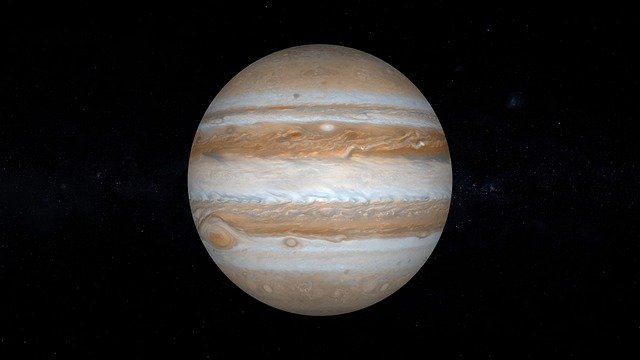
The question arises whether it is possible or not for the person to set foot on Jupiter. If this were to be attempted, what would happen?
Let us look at some facts about Jupiter.
It has 63 known moons, two spacecraft have visited it so far, one being Galileo in 1995 and the other being Juno which arrived in 2016 for a two-year orbit of the planet.
Jupiter is a giant ball of gas, mainly hydrogen and helium, in fact, it is two and a half times the mass of all the other planets combined.
Its volume would be 1,321 times that of Earth’s. Its surface gravity is 2.5 times that of Earth which makes it difficult for a human to stand. If a person did manage to set foot on Jupiter, they would be crushed by the weight of the gas above them.
Jupiter also has a very strong magnetic field, much stronger than Earth’s. This magnetic field traps particles from the sun and creates a powerful radiation belt around the planet.
The radiation belt is so powerful that it could kill any person who ventured into it.
It is unlikely that man will ever set foot on Jupiter for obvious reasons related to its crushing weight and the powerful magnetic field.
Some other obstacles are the strong winds, which can reach an amazing 400mph, and surface temperatures of minus 145 celsius.
Would a human survive on Jupiter?
The answer to this question is no.
A human would not be able to survive on Jupiter because of the crushing weight of the gas, the powerful magnetic field, and the extreme temperatures.
The radiation belt around Jupiter is also very powerful and could kill a person who ventured into it. It is unlikely that man will ever set foot on Jupiter for these reasons.
There are other obstacles that would make it impossible for a human to survive on Jupiter, such as the strong winds which can reach up to 400mph and the extremely cold surface temperatures.
Jupiter is also surrounded by many moons, two spacecraft have visited it so far, one being Galileo in 1995 and the other being Juno which arrived in 2016 for a two-year orbit of the planet.
From this information, it can be concluded that a human will never set foot on Jupiter for reasons including crushing weight, powerful magnetic field, and extreme temperatures.
The radiation belt around Jupiter is also very powerful which could kill a person who ventured into it. It is unlikely that man will ever set foot on Jupiter for these reasons.
What does it take for a man to live on Jupiter?
A human could never live on Jupiter because of the crushing weight of the gas, the powerful magnetic field, and the extreme temperatures.
The radiation belt around Jupiter is also very powerful and could kill a person who ventured into it. It is unlikely that man will ever set foot on Jupiter for these reasons.
There are other obstacles that would make it impossible for a human to survive on Jupiter, such as the strong winds which can reach up to 400mph and the extremely cold surface temperatures.
Jupiter is also surrounded by many moons, two spacecraft have visited it so far, one being Galileo in 1995 and the other being Juno which arrived in 2016 for a two-year orbit of the planet.
From this information, it can be concluded that a human will never set foot on Jupiter for reasons including crushing weight, powerful magnetic field, and extreme temperatures.
The radiation belt around Jupiter is also very powerful which could kill a person who ventured into it. It is unlikely that man will ever set foot on Jupiter for these reasons.
Can we land on Jupiter’s moons?

Jupiter has many moons and two spacecraft have visited it so far.
This information suggests that we could land on Jupiter’s moons because we now know they exist and we have already explored them with spacecraft.
It is possible to land on these moons as we now know they exist and one spacecraft has visited them before, this has shown us that it is possible.
We may even be able to live on these moons in the future, due to technological advancements.
It is possible to land on Jupiter’s moons because we now know they exist and one spacecraft has visited them before. This shows that it is possible for us to land on these moons.
We may even be able to live there in the future, due to technological advancements.
- Related post: What Would Happen If the Sun Approaches Earth
- Related post: What would the world be like If the earth had two moons
What is Jupiter made of?
Jupiter is made mostly of hydrogen and helium. These gases are very dense and make up the crushing weight of Jupiter. It also has a powerful magnetic field, which is created by the gas rotating around the planet.
Jupiter also has a rocky core, which is where the powerful magnetic field is generated.
The gas rotating around Jupiter creates a powerful magnetic field which is why the planet has one. Jupiter also has a rocky core, this is where the powerful magnetic field is generated so it must be in this area.
Jupiter is mostly made of hydrogen and helium which make up for its crushing weight. It also has a powerful magnetic field created by the gas rotating around the planet with a rocky core being the source of this field.
Conclusion
A human will never set foot on Jupiter because of the crushing weight, powerful magnetic field, and extreme temperatures. The radiation belt around Jupiter is also very powerful which could kill a person who ventured into it.
It is unlikely that man will ever set foot on Jupiter for these reasons.
There are other obstacles that would make it impossible for a human to survive on Jupiter, such as the strong winds which can reach up to 400mph and the extremely cold surface temperatures.
Jupiter is also surrounded by many moons, two spacecraft have visited it so far, one being Galileo in 1995 and the other being Juno which arrived in 2016 for a two-year orbit of the planet.
From this information, it can be concluded that a human will never set foot on Jupiter for reasons including crushing weight, powerful magnetic field, and extreme temperatures.
The radiation belt around Jupiter is also very powerful which could kill a person who ventured into it. It is unlikely that man will ever set foot on Jupiter for these reasons.



